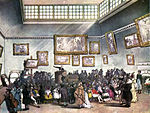
An advance-fee scam is a form of fraud and is one of the most common types of confidence tricks. The scam typically involves promising the victim a significant share of a large sum of money, in return for a small up-front payment, which the fraudster claims will be used to obtain the large sum. If a victim makes the payment, the fraudster either invents a series of further fees for the victim to pay or simply disappears.
A shill, also called a plant or a stooge, is a person who publicly helps or gives credibility to a person or organization without disclosing that they have a close relationship with said person or organization. Shills can carry out their operations in the areas of media, journalism, marketing, politics, sports, confidence games, or other business areas. A shill may also act to discredit opponents or critics of the person or organization in which they have a vested interest.

An auction is usually a process of buying and selling goods or services by offering them up for bids, taking bids, and then selling the item to the highest bidder or buying the item from the lowest bidder. Some exceptions to this definition exist and are described in the section about different types. The branch of economic theory dealing with auction types and participants' behavior in auctions is called auction theory.
The Spanish Prisoner is a confidence trick originating by at least the early 19th century, as Eugène François Vidocq described in his memoirs.

A charlatan is a person practicing quackery or a similar confidence trick in order to obtain money, fame, or other advantages through pretense or deception. Synonyms for charlatan include shyster, quack, or faker. Quack is a reference to quackery or the practice of dubious medicine, including the sale of snake oil, or a person who does not have actual medical training who purports to provide medical services.
Bait-and-switch is a form of fraud used in retail sales but also employed in other contexts. First, customers are "baited" by merchants' advertising products or services at a low price, but when customers visit the store, they discover that the advertised goods are not available, or the customers are pressured by salespeople to consider similar, but higher-priced items ("switching").

The shell game is often portrayed as a gambling game, but in reality, when a wager for money is made, it is almost always a confidence trick used to perpetrate fraud. In confidence trick slang, this swindle is referred to as a short-con because it is quick and easy to pull off. The shell game is related to the cups and balls conjuring trick, which is performed purely for entertainment purposes without any purported gambling element.

Internet fraud is a type of cybercrime fraud or deception which makes use of the Internet and could involve hiding of information or providing incorrect information for the purpose of tricking victims out of money, property, and inheritance. Internet fraud is not considered a single, distinctive crime but covers a range of illegal and illicit actions that are committed in cyberspace. It is, however, differentiated from theft since, in this case, the victim voluntarily and knowingly provides the information, money or property to the perpetrator. It is also distinguished by the way it involves temporally and spatially separated offenders.

An online auction is an auction which is held over the internet. Like auctions in general, online auctions come in a variety of types like ascending English auctions, descending Dutch auctions, first-price sealed-bid, Vickrey auctions and others, which are sometimes not mutually exclusive.

Email fraud is intentional deception for either personal gain or to damage another individual by means of email. Almost as soon as email became widely used, it began to be used as a means to defraud people. Email fraud can take the form of a "con game", or scam. Confidence tricks tend to exploit the inherent greed and dishonesty of its victims. The prospect of a 'bargain' or 'something for nothing' can be very tempting. Email fraud, as with other 'bunco schemes,' usually targets naive individuals who put their confidence in schemes to get rich quickly. These include 'too good to be true' investments or offers to sell popular items at 'impossibly low' prices. Many people have lost their life savings due to fraud.
In business, the term boiler room refers to an outbound call center selling questionable investments by telephone. It usually refers to a room where salespeople work using unfair, dishonest sales tactics, sometimes selling penny stocks or private placements or committing outright stock fraud. A common boiler room tactic is the use of falsified and bolstered information in combination with verified company-released information. The term carries a negative connotation; it is often used to imply high-pressure sales tactics and, sometimes, poor working conditions.

The white van speaker scam is a scam sales technique in which a con artist makes a buyer believe they are getting a good price on home entertainment products. Often a con artist will buy inexpensive, generic speakers and convince potential buyers that they are premium products worth hundreds or thousands of dollars, offering them for sale at a price that the buyer thinks is heavily discounted, but is actually a heavy markup from their real value. Con artists in this type of scam call themselves "speakerguys" or "speakermen", and usually claim to be working for a speaker delivery or installation company.
Consignment involves selling one's personal goods through a third-party vendor such as a consignment store or online thrift store. The owner of the goods pays the third-party a portion of the sale for facilitating the sale. Consignors maintain the rights to their property until the item is sold or abandoned. Many consignment shops and online consignment platforms have a set day limit before an item expires for sale.
A bidding fee auction, also called a penny auction, is a type of all-pay auction in which all participants must pay a non-refundable fee to place each small incremental bid. The auction is extended each time a new bid is placed, typically by 10 to 20 seconds. Once time expires without a new bid being placed, the last bidder wins the auction and pays the amount of that bid. The auctioneer profits from both the fees charged to place bids and the payment for the winning bid; these combined revenues frequently total more than the value of the item being sold. Empirical evidence suggests that revenues from these auctions exceeds theoretical predictions for rational agents. This has been credited to the sunk cost fallacy. Such auctions are typically held over the Internet, rather than in person.
A money mule, sometimes called a "smurfer," is a person who transfers money acquired illegally in person, through a courier service, or electronically, on behalf of others. Typically, the mule is paid for services with a small part of the money transferred. Money mules are often dupes recruited on-line for what they think is legitimate employment, not aware that the money they are transferring is the product of crime. The money is transferred from the mule's account to the scam operator, typically in another country. Similar techniques are used to transfer illegal merchandise.
Employment fraud is the attempt to defraud people seeking employment by giving them false hope of better employment, offering better working hours, more respectable tasks, future opportunities, or higher wages. They often advertise at the same locations as genuine employers and may ask for money in exchange for the opportunity to apply for a job.
Telemarketing fraud is fraudulent selling conducted over the telephone. The term is also used for telephone fraud not involving selling.

Auto auctions are a method of selling vehicles based on an auction system. Auto auctions can be found in most countries and are usually exclusive to licensed automobile dealers. In a few countries, such as Japan, auto auctions are well known and used by most residents.
The green goods scam, also known as the "green goods game", was a fraud scheme popular in the 19th-century United States in which people were duped into paying for worthless counterfeit money. It is a variation on the pig-in-a-poke scam using money instead of other goods like a pig.







